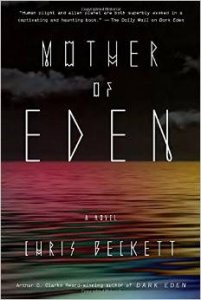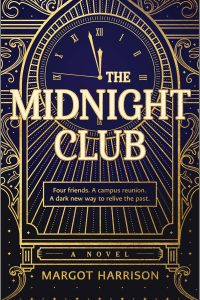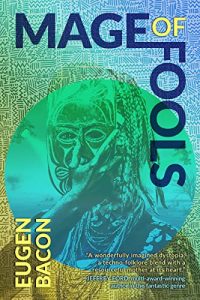Paul Di Filippo reviews Chris Beckett
Mother of Eden, Chris Beckett (Broadway 978-0-8041-3870-3, $15, 480pp, trade paperback) May 2015
 Return with me now to the thrilling days of yesteryear—namely July of 2013—when I had occasion to review in this same cyberspace Chris Beckett’s novel Dark Eden. Are you up to speed on this intriguing universe? Good! Now we can address the entrancing and laterally different sequel, Mother of Eden.
Return with me now to the thrilling days of yesteryear—namely July of 2013—when I had occasion to review in this same cyberspace Chris Beckett’s novel Dark Eden. Are you up to speed on this intriguing universe? Good! Now we can address the entrancing and laterally different sequel, Mother of Eden.
One of the great things about science fiction is its capaciousness, its big-tent welcome to any number of different stories and modes that fall outside the central core of future worlds & robots & starships & dystopias & time travel, etc. A certain novel can read as if it belongs in some other genre, yet be pure SF. This is one of the reasons a broad consensus definition of the genre is so hard to attain. Any time you think you have an airtight definition, exceptions by the handful arise, books which are indubitably SF yet don’t fit this particular straitjacket.
I mentioned in my review of Dark Eden that it overlapped partially with the Clan of the Cave Bear-type novel, the kind of story that is about humans prior to our civilization learning the rudiments of how the world works. Of course, in Beckett’s scenario, it’s future humans who have been stripped of civilization by dire circumstances and now have to regain it. (And in a sense, so estranged are they from us that they almost resemble aliens.) I also alluded to the kind of “steel beach” cloistered and formative environment tale done by Niven and Baxter among others. But I did not have the sense at the time to mention the one book that Dark Eden most resembled, and that would be Jack Vance’s The Dragon Masters. Now, in this volume, Beckett conflates Vance’s The Last Castle, with its saga of isolated battling redoubts, to produce a work that carries his stranded offworlders a step further in their skewed recapitulation of the same grim eras that humanity endured on the home planet.
It is a couple of generations beyond the events of the prior book, and humanity is doing fairly well on their new strange planet with no sunlight. Several centers of civilization now exist, and although they are puny by Earth standards (one of the biggest, Edenheart, has thirty whole structures!), they represent a major improvement in living conditions. A native source of metal has been discovered; clothing is more sophisticated; and even money has been invented! Plainly, things are looking up.
Although he employs very clever alternating points-of-view from chapter to chapter, which shed Rashomon-style contrasting lights on matters, our heroine is plainly Starlight Brooking. A beautiful, smart yet somewhat naïve girl from one of the more primitive settlements, she travels to a big trading town, has her mind opened, then falls for the visiting scion of Edenheart, young Greenstone Johnson. They immediately bond out of both romantic and practical inclinations, and soon Starlight is saying goodbye to her kin and making the long dark journey to Edenheart, to become the wife of this young headman (contingent on the eventual natural death of Greenstone’s father). This narrative is to be Starlight’s strange journey, from the depths to the heights and down to the depths of existence again, before finding an ultimate equilibrium. I might also mention at this junction that Beckett’s linguistic experimentation, while still evident and pleasurable, seems somewhat toned down for this outing, as if he were more focused on the all-too-human story rather than the already accomplished worldbuilding.
What Beckett is doing here, in some ways, is giving us a kind of bush-leagues Game of Thrones, all powerplays and betrayals and factions, nobility mixed with scurrilousness. It’s small scale, but none the less impactful for the players—and none the less fascinating to follow, despite its small scale. (Greenstone’s father compares life for the Headsman to an endless game of chess.) Donning Gela’s Ring, a rare talismanic remnant of Earth, Starlight becomes a kind of Evita figure, out to redeem the “small people” of Edenheart, as well as the enslaved native “cutbats.” As is almost inevitable in such legends, she bucks the establishment and the establishment punches back. She is thrown into a fight for survival that brings out her utmost courage and resourcefulness.
Beckett’s themes are societal inequalities, the strengths and dangers of mythmaking, the ways in which knowledge is power. One gets an almost Biblical, early dynastic sense of history here, and something of a foreshadowing that life on Eden will continue to replicate the lines of the history we know. Will the next installment jump forward to find the planet in Medieval or Renaissance conditions? Something along those lines, I bet.
One final aspect of the book to mention: the Romeo and Juliet star-crossed relationship between Starlight and Greenstone. (Starlight even acquires a Nurse figure named Quietstream, to complete the resonance.) When events drive the lovers apart, each to their own separate fate, it’s truly heartbreaking. This added dimension to what might otherwise have been a slightly programmatic lesson in the rise-and-fall of two reformers shows us Beckett’s skill and passion at play.




